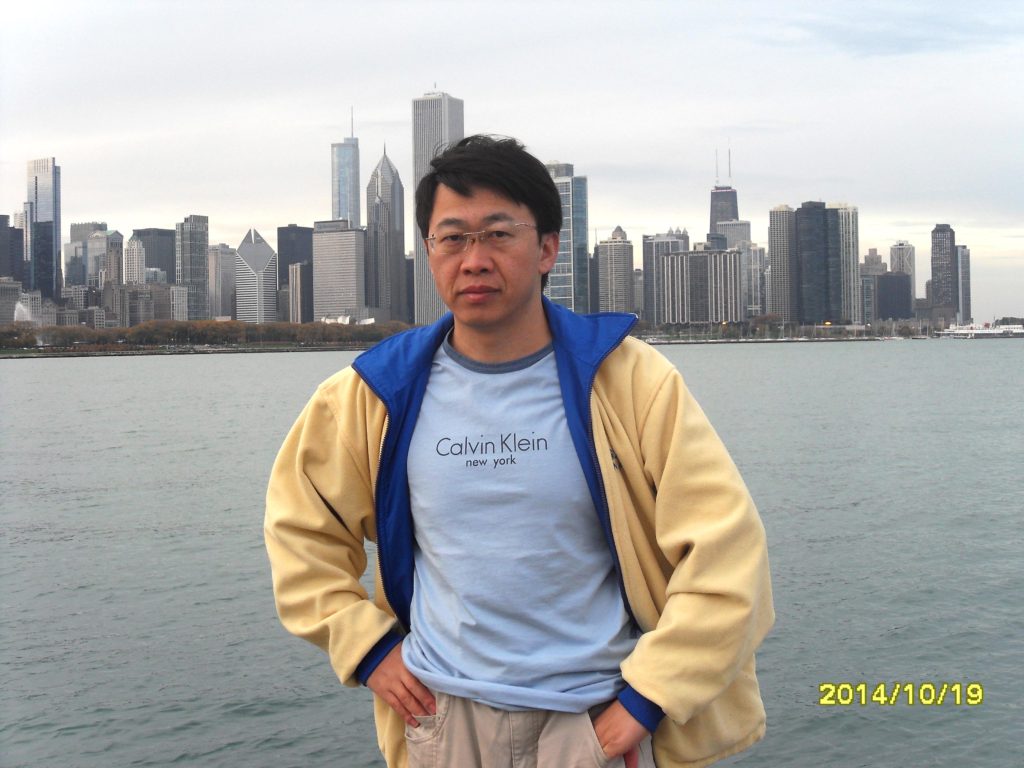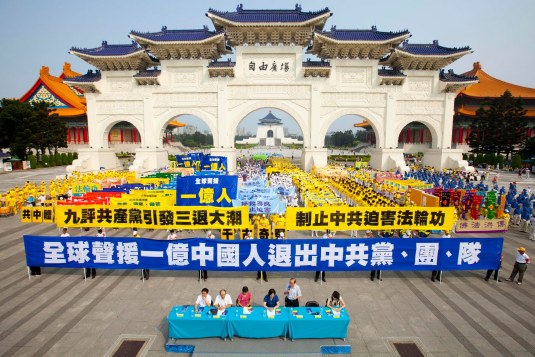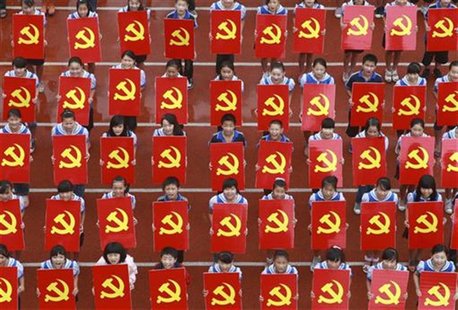Over 1.5 million people a month — almost 195 million people to date — have renounced their links to the Chinese Communist Party (CCP) since the Tuidang Movement (in mandarin Chinese Tuidang means ‘withdraw from the party’) was founded in January 2005, spurred by the publication of the ‘Nine Commentaries on the Communist Party’, an editorial series run by the Epoch Times, a Chinese language newspaper based in the United States.
The Nine Commentaries seeks to give a historical account and critique of the Communist Party, its ideologies, its practices, its effects on China’s culture and values and what it has meant for the ordinary lives of Chinese citizens. The Nine Commentaries may be for many Chinese the only alternative to China’s authorities’ own account of major historical events, such as the Great Leap Forward, the Cultural Revolution, the 1989 Tiananmen Square Massacre. And while the series does not directly call for the end of the CCP, in its ninth of the Nine Commentaries it calls on people to distance themselves from the party.
As soon as the series was run in November 2004, statements of withdrawal from the CCP began to arrive at the offices of the Epoch Times, which led a group of volunteers to officially start the Tuidang movement in January 2005. According to David Tompkins, Director of Public Relations at the Tuidang Centre in New York, many Chinese had been harbouring a desire to renounce their ties to the CCP for a long time, and reading the Nine Commentaries gave them the encouragement and the opportunity to follow it through.
The movement relies on a global network of volunteers operating within most places in which a Chinese community is present. However it is in China that the movement is most active, with some several hundred thousand volunteers, often acting alone, unable to communicate with one another, and at great personal risk. Indeed, research by the Tuidang Centre showed that of the 100 million statements of withdrawals received by 2011, around 99 percent came from China. While Tomkins acknowledges that such percentage may not be quite so high now, he thinks the ratio is still not far off.
‘Tuidang’ literally means ‘to withdraw from the party’, but effectively it means to renounce the CCP ideology and to symbolically take back the oath given to the party either through the Young Pioneers, the Communist Youth League, or the CCP proper. And while official sources put CCP membership in China at around 85 million, party ideology permeates much more of Chinese society, with some 700 million Chinese estimated to have taken the oath through either of these organisations at some point in their lives.
Tuidang is more than just symbolically taking back the oath however, as Tompkins explains. The movement wants to empower people to think for themselves once again, to hold beliefs that are not prescribed and to look at the party more critically, while also seeking to reconnect Chinese people with the traditional value systems of Confucianism, Buddhism and Daoism, belief systems which the party treats as enemy of the state. Such intellectual and ethics freedom, which people in the West take for granted, has been systematically opposed since the CCP came into power, through censorship, persecution, imprisonment, torture or killing of those who don’t toe the party line.
The CCP has to date failed to issue an official party response to the Tuidang Movement, as this would acknowledge the threat that it poses. Yet responded it has. Terms like ‘Tuidang’ and ‘Nine Commentaries’ are highly censored in internet searches, and media outlets reporting on Tuidang risk immediate closure, such as the case of Jinzhou News. On 27 September 2009, with the 60th Anniversary of the CCP only a few days away, the paper published on its front page a photo of red flags and banners. Down in the left corner the photo also showed a bike rack with a message written on it encouraging people to leave the party. As soon as the issue was released, the newspaper was shut down and all copies withdrawn from circulation.
Internet and media censorship aside, other government measures to counteract threats to its power include: an increased domestic security budget – the courts, policing, the prosecutor’s office; party members recruitment, and more than a whiff of Mao propaganda, such as the ‘singing red songs’ campaign, during which people were invited or coerced into singing CCP slogans at public events.
Yet, despite government repression, momentum has been steadily growing within the Tuidang movement, and some 120 thousand statements of withdrawal are currently reaching the Tuidang Centre in New York daily.
The cause has no doubt been helped by high profile cases, such as that of Zhisheng Gao. Gao is a much respected human rights lawyer who spent half of his career practicing pro-bono for the poorest in China, and was one of the first lawyers to take on Falun Gong cases. He has endured repeated imprisonment and torture for its human rights work, and is currently under house arrest and unable to communicate freely with his family.
Accounts of imprisonments and torture at the hands of the Chinese government’s domestic security apparatus are as numerous as they are harrowing. Like that of Zhiming Hu, a 28-year-old electronics engineer and a major officer in the Chinese air force, whose experience almost cost him his life.
At 2 a.m. on the 4th October 2000, members of the National Security Bureau knocked, under a false pretext, on Zhiming Hu’s door at the Shanghai hotel in which he had been staying. They rushed in, arrested him and took him away, alleging that he was a spy. Hu was taken to Tilanqiao Prison in Shanghai. Right from the start he suffered mental and physical torture at the hands of prison guards and inmates alike. For the first three weeks he was interrogated constantly and beaten, his hands and waist handcuffed together as he refused to recite the prison regulations and to wear inmates’ clothes.
A whole year went by before the authorities appointed him a lawyer at the beginning of court proceedings, and on 14th September 2001 Hu was finally sentenced by the Pudong District Court to four years in prison for “teaching others to browse the minghui.org website” – a Falun Gong website.
Hu’s four year sentence was spent between detention centres and prison hospitals. After his sentencing, he was put into a three square meter cell where he remained for two years, enduring many more beatings and torture. Towards the end of its sentence, in August 2004, the authorities became more heavy-handed, instigating beatings and depriving Hu of sleep. He started a hunger strike in protest.
One day, as he laid unconscious, he was taken to the prison hospital where his legs, arms and body were tightly bound to the bed. There he was forced-fed, and for three weeks injected with drugs of unknown therapeutic benefit, which gave him pounding headaches that lasted for hours. He remained in hospital, bound to the bed, for 40 days until his sentence had expired. Unable to move as a result of the binding, his parents came to collect him and had to carry him home. It was the 3rd October 2004.
It was not to be the end of Hu’s ordeal.
One year later, on the evening of the 23rd September 2005, as he was distributing DVD copies of the ‘Nine Commentaries on the Communist Party’ on the streets of Beijing, Hu was apprehended by plain clothes police and taken to Haidian District Detention Centre in Beijing. Just like before, he had no contact with his family and just like before the authorities appointed his lawyer only shortly before the trial some seven months later, when Hu was given 30 minutes to talk with him. At the trial, on 26th April 2006, he was sentenced to another four years in prison.

Hu recounts how this time he was treated even worse, so that on 13th May 2006 he started a hunger strike to protest his unlawful detention and inhumane conditions. After five days he was sent to a hospital where a series of physical examinations began, with many blood samples taken during which he reckons unnecessary pain was deliberately inflicted upon him. The tests continued back at the detention centre where he would be given daily injections, and was closely watched twelve hours a day, before been sent back to the hospital on May 24th, where for the following five months his feet were chained to the bed.
To try to make him give up his hunger strike prison officers and doctors would beam bright lights into Hu’s eyes, force-feed him daily, and let him lay in his own excrement for long periods of time. Hu recounts how once an over one meter long tube was inserted through his nose into his stomach. As he complained to the medical staff that the procedure disregarded the maximum allowance of 0.5 meter for such procedures, they quickly removed the tube, causing severe pain and internal bleeding that lasted longer than a month.
Unsuccessful in getting Hu to resume eating, doctors started reducing his force-feeding and moved him to a contagious diseases ward, the same ward where he recalls other fellow Falun Gong practitioners, some of whom had later died, had also previously been sent to. Five months later, with a body weight of 40kg, down from 60kg, Hu’s health had seriously deteriorated.
In September 2006 when the authorities belatedly asked him to sign his verdict, Hu refused. By October Hu got worse, and fearing he may die, the prison staff increased monitoring during the day and woke him up every two hour at night, before sending him to the Tuanhe Detainee Transfer Centre, where he was refused on the basis of his poor health.
Back to the detention centre and now supposed to be transferred to the City Prison hospital, the guard responsible for his transfer, tired and reluctant to take him, decided to kick Hu’s legs until they were numb. The next day, an electromyography examination found that Hu’s leg muscles had severe atrophy and that his legs nerves had suffered physical damage, probably due to a combination of his bed-chaining for months, as well as the kicking he suffered.
On 2nd November 2006 Hu Was transferred to the Jinzhou Prison in Liaoning Province. Body covered in festers, force-feeding was resumed. By now Hu was lingering between life and death and his parents hoped he could be bailed out, but the prison refused. Three more years imprisonment followed, during which Hu was bed-bound, except when using a wheelchair to visit the toilet. More torture by police officers, harassment by inmates, and dubious medical procedures ensued.
Body weak and severely malnourished, legs stiff with muscular atrophy and nerve damage, Hu’s health continued to deteriorate. On 22nd September 2009, afraid of the consequences of his possibly imminent death, the prison hurriedly shifted its duty to its local police station and residential committee, who in turn also hurriedly sent Hu back home to his parents, barely alive.
With the help of Falun Gong exercises Hu gradually recovered and started to regain mobility in his legs, and two months later he was able to stand and to walk again, although the damage to his nerves meant that he could only do so backwards.
On 4th February 2010 after Hu was seen once again walking outside, four members of local 610 Office – a national office formed for persecution of Falun Gong practitioners – and the residential committee broke into Hu’s house. Hu was lucky not to be home at the time, however his parents were warned not to let him go outside again, and to report any of Hu’s activities to them. Hu realised that he would not be safe in China.
Two weeks later, during the Chinese Spring Festival on 17th February 2010, Hu left his house without telling a soul. He caught a train to the Unan province and then a seven hour bus ride to the Vietnam border. There he was lucky to find someone who smuggled him across the border into Vietnam. Two weeks later he reached Cambodia and on 1st March 2010 he made it into Thailand, where he was granted political asylum and remained for two years. Then, on 2nd August 2012 Hu joined his brother in the US.
Having almost completely healed from his disability, Hu now lives in New York where he works as a software engineer. His father and two brothers remain in China. He speaks with them regularly, and although their conversations are tapped, his family back home are no longer subjected to harassment.
Hu counts himself lucky. Lucky that he survived what other fellow Falun Gong practitioners did not, such as Litian Zhang who on 17th November 2008 was beaten to death in JinZhou prison.
Hu’s faith in Falun Gong is what got him incarcerated in the first place, but he says it is also what ultimately kept him alive throughout his ordeal. Outside the prison walls Hu’s brother campaigned US Congress and wrote letters to the UN Human Rights Commission. And, aided by a Falun Gong’s campaign through which the personal telephone numbers of prison officers involved in torturing Falun Gong’s practitioners were published, he kept phoning the prison staff who were mistreating Hu, asking them to stop persecuting him.
Such activities may not have achieved Hu’s early release from prison, but they did put pressures on the authorities, and highlight the tenacity of Hu’s family and human rights campaigners in their fight against violent repression of dissent. Such tenacity can be a powerful weapon as the Chinese government are all too aware.

Momentum has been steadily rising within the Tuidang movement. Thanks to a network of courageous volunteers in China, and the world, a growing number of Chinese people can look more critically at, and challenge the party who rules them.
Yet the story of Hu, and of too many others like him, shows that regardless of its more liberal economy and an apparent softening stance in its international relations, persecution, torture and killing are still China’s policies of choice in dealing with domestic threats to its rule.
Tompkins argues that while many Chinese now enjoy greater wealth, being able to afford mobile phones does not make up for all the basic freedoms that they are still deprived of. What they think, what they believe, what they say, who they associate themselves with, whether they can have a child or the decision when to marry, are all still ruled by the state in China. Western governments, businesses and consumers could do a lot more to ensure that such basic freedoms are promoted in China.
A view much echoed by Teng Biao, a Human Rights lawyer and a visiting fellow at Harvard University Law School, Biao had his lawyer’s license revoked in China, was expelled from his university and was kidnapped and disappeared several times. Biao said: “…Sycophants inside and outside China are able to imagine a ‘spring for rule of law’ that doesn’t exist while ignoring human rights disasters suffered by Ilham Tohti, Xu Zhiyong, Cao Shunli, Gao Zhisheng, Uighurs, Tibetans, petitioners, Falun Gong adherents, and house churches… this type of seemingly even-handed wishful thinking has become the excuse for Western governments to adopt short-sighted policies of appeasement in dealing with autocratic regimes and for favouring trade over human rights.”
Indeed, repression costs money and flourishing exports receipts underpin the Chinese government ability to silence its opposition at home, but also give it leverage in international negotiations, not only in the geopolitical arena, but ironically in Human Rights debates.
On asking about what it will mean for the organisation to hit 200 million withdrawal statements, Tompkins admits that they still have a long way to go, but that it is nevertheless a milestone and an opportunity to get more people aware of and involved in the movement, particularly in the West.
It is a long way to a free and democratic China, and much still is to be done by the Tuidang and other human rights movements, and by ordinary citizens turned activists, like Zhiming Hu, whose actions are nothing short of the heroic. Yet according to Hu and Tompkins, over the ten years since the movement started a mood change has been palpable, with more and more Chinese people denouncing their government’s corruption and violence towards its very own citizens. Both are unanimous in also saying that for it to succeed this battle is not for China alone.
By Annalisa Dorigo
